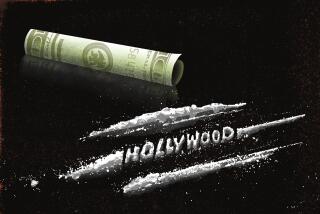In search of both Bobby Fischers
- Share via
Journalist Frank Brady remembers the moment when Bobby Fischer first mesmerized the chess world.
It was October 1956. Fischer, then just 13, was matched against 25-year-old Donald Byrne, an international master, in a tournament in lower Manhattan.
A pack of kibitzers surrounded the pair when suddenly, Fischer moved his queen, the most powerful piece on the chessboard, to a seemingly vulnerable position. Byrne moved to capture Fischer’s queen, only to find himself checkmated after 41 moves and five hours.
In chess lore, the encounter became known as the “Game of the Century.”
“The single most important quote of Bobby’s was, ‘I’m always on the attack,”’ says Brady, author of “Endgame: Bobby Fischer’s Remarkable Rise and Fall — From America’s Brightest Prodigy to the Edge of Madness” (Crown). “That was him, in chess and in life.”
As the teenager developed into America’s greatest player, Fischer and Brady, then editor of Chess Life magazine, enjoyed a close relationship. They spent time in Greenwich Village sharing meals at the Cedar Tavern and playing endless games of “speed chess” at the Marshall Chess Club.
In 1965, Brady wrote “Profile of a Prodigy.” The first biography of Fischer, then 22, was an insider’s account of his journey from poverty to the cusp of challenging for the world championship.
Brady allowed Fischer to read “Profile” before publication, and Fischer objected to being identified as Jewish in the book. When Brady explained that, under Talmudic law, Bobby was deemed Jewish because his mother, Regina, was Jewish, Bobby’s reply was curt.
“His argument was, ‘I don’t give a crap about Talmudic law,’ ” Brady remembers.
Fischer severed ties with Brady over the reference. The two didn’t speak in 1972, when Brady traveled to Iceland for PBS and reported on Fischer’s riveting triumph over Russia’s Boris Spassky for the world title, an epic match that Brady describes in “Endgame” as a Cold War “contest of intellect and will involving thirty-two enigmatic pieces.”
Then Brady watched the media-phobic Fischer walk away from the game at the pinnacle of success. “Bobby was like a J.D. Salinger or a Greta Garbo,” he says. “He wanted to be left alone. He had something like $10 million in endorsements on the table [after Iceland], but he thought that was beneath him.”
Afterward, Brady said, “I wanted to divorce myself from Bobby. I had other lives I wanted to write about,” including biographies of Orson Welles (“Citizen Welles”) and Aristotle Onassis (“An Extravagant Life”).
Fischer surfaced occasionally in Southern California, where he lived after Iceland. Pasadena police once mistook him for a bank robber, then arrested him for vagrancy. He self-published an 8,500-word essay about the experience titled, “I Was Tortured in the Pasadena Jailhouse!”
He abandoned the U.S. for Europe and Asia, a wandering and deeply paranoid misfit. His venomous and profane attacks after 9/11 — “I applaud the act,” Fischer said, “I want to see the U.S. wiped out” — made him a pariah.
“I went ballistic over those comments,” Brady admits, and he pushed to have Fischer expelled from the U.S. Chess Federation.
Now chair of the communication and media studies department at St. John’s University, Brady reevaluated his position after Fischer’s death in 2008. “I started thinking, can we listen to Wagner, who created great music even though he was anti-Semitic?” he asked. “In the same way, can we honor Bobby Fischer?”
In “Endgame,” Brady explores both sides of Fischer and offers a nuanced perspective of the chess genius. Fischer’s early study of the chessboard made him a prodigy on the order of Tiger Woods in golf. But with the exception of one big-money match — against Spassky in 1992 — Fischer abandoned the game post-1972, leaving American chess fans bereft.
Fischer’s love of chess never waned, according to Brady, but his unrelenting anti-Semitism and maddening behavior drove away even his closest supporters. Young chess players know him only through the book-turned-1993-film “Searching for Bobby Fischer.”
Brady’s self-described “tempestuous relationship” with Fischer informs the book, as does a return trip to Iceland, where Fischer spent his final years in exile. Brady culled an archive’s worth of personal material, including a treasure trove of moldy family papers from Fischer’s now-deceased sister that were eventually passed on to the Marshall Chess Club (where Brady is president).
FBI and KGB files about the life of Regina Fischer are now available, shedding light as to the possible identity of Bobby’s biological father. His birth certificate named Hans Gerhardt Fischer, a German biophysicist.
In 2009, Los Angeles Times reporter Peter Nicholas and his wife, Clea Benson, concluded that evidence pointed to another physicist, a Hungarian Jew named Paul Felix Nemenyi, as Fischer’s father. Brady remains uncertain on the issue.
Brady also is a consultant on a new documentary, “Bobby Fischer Against the World.” Directed by Liz Garbus and screened at Sundance, the film will air on HBO this summer, around the time photographer Harry Benson will publish a book of Fischer images.
The biography, the documentary and the photographs indicate that our fascination with Fischer refuses to fade.
“Bobby brought brilliance, joy and beauty to the chessboard, and we should respect that,” Brady says. “He was the Mozart, the Rembrandt, the Picasso of chess. But we also have to look at what the man became in his fall from grace. He ended up being not a very good person.”
Davis is writing a book on the 1908 Olympics.
More to Read
Sign up for our Book Club newsletter
Get the latest news, events and more from the Los Angeles Times Book Club, and help us get L.A. reading and talking.
You may occasionally receive promotional content from the Los Angeles Times.










